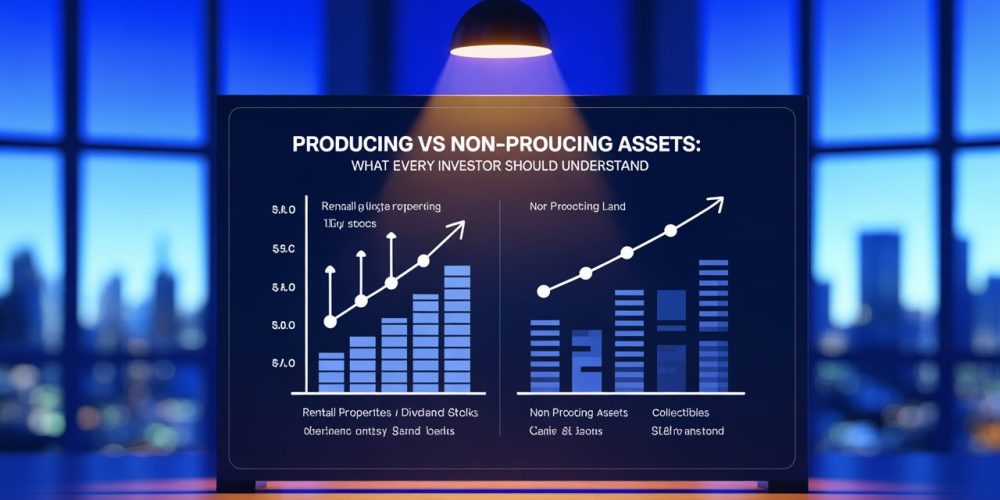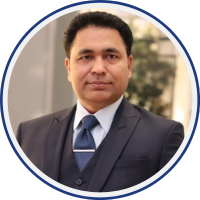When it comes to building wealth, not all assets are equal. Some assets work for you every day and produce income. Others simply sit there, storing value but not generating cash flow.
If you’re serious about growing your money, you must understand the difference between producing assets and non-producing assets.
What Are Producing Assets?
Producing assets are investments that generate income or cash flow in addition to possibly increasing in value.
They don’t just sit idle — they “produce.”
Examples of Producing Assets:
- Rental Property: A house or apartment you rent out. Every month, it pays you rent. Over time, the property value might also rise.
- Stocks (Equities): When you buy shares of a company, many pay you dividends – a portion of profits. Plus, the stock value can grow.
- Bonds: Lend money to governments or companies, and they pay you interest regularly.
- Businesses: Owning or investing in a business can produce steady profits.
Why they matter: Producing assets help you create income while you sleep. The money keeps flowing, whether you are working or not.
What Are Non-Producing Assets?
Non-producing assets do not generate income on their own. They may hold value or appreciate over time, but they don’t pay you anything while you own them.
Examples of Non-Producing Assets:
- Gold: It shines, it’s valuable, but it doesn’t pay rent or dividends. Your gold bar will be the same bar 10 years from now — unless the price goes up.
- Vacant Land: Unless you farm it, rent it, or develop it, the land just sits there. Land-Banking is very profitable – Capital Appreciation with strategic purchase, I will cover Land-Banking in separate article.
- Collectibles (art, watches, cars): They may rise in price, but they don’t produce income.
Why they matter: Non-producing assets are often used as stores of value or hedges against risk (e.g., inflation, currency collapse). They preserve wealth, but they don’t grow it by themselves.
Real-Life Comparison: Gold vs Property
Let’s make this simple.
- If you buy $100,000 in gold, you own gold worth $100,000. In 10 years, maybe it’s worth $130,000 if prices rise. But during those 10 years, it produced zero income.
- If you buy a $100,000 rental property, tenants may pay you $8,000 in rent every year. Over 10 years, that’s $80,000 in income plus possible property appreciation.
One grows your wealth passively.
The other just sits, waiting for market prices to change.
When Do Non-Producing Assets Make Sense?
This doesn’t mean non-producing assets are useless. Gold, for example, can be a safe haven during crises. It protects against inflation or currency collapse.
But if your goal is growth, you cannot rely only on non-producing assets.
In countries where currencies are always under pressure – such as Turkey, Lebanon, Pakistan, or India – buying gold in small chunks as funds become available is a wise protective measure. It doesn’t generate income, but it shields your wealth from erosion caused by currency devaluation. Think of it as insurance: it won’t grow your net worth, but it will prevent you from losing it.
A balanced portfolio usually contains both:
- Producing assets for income and compounding.
- Non-producing assets for stability and protection.
Why Most People Get Confused
Many new investors focus only on price changes – “Did it go up or down?”
But they forget the cash flow question – “Is this paying me while I hold it?”
That’s the essence of financial maturity: not just hoping an asset grows in price, but choosing assets that grow and pay you along the way.
Final Thoughts
If you want to build lasting wealth, you must prioritize producing assets. They are the engine of compounding and financial independence.
- Property, stocks, bonds, and businesses produce income.
- Gold, vacant land, and collectibles are stores of value.
Both can play a role. But remember:
Gold will protect you. Property and stocks will grow you.
Before making any investment move, make sure your foundation is strong:
- 📌 11 Fundamental Money Concepts Everyone Should Master
- 📌 The Foundation of Wealth: Your Safety Net Strategy
- 📌 What is Risk-Adjusted Return (and Why Every Investor Must Understand It)
Without fundamentals, a safety net, and risk awareness, you’re not investing — you’re gambling.
#MunawarAbadullah #WealthWithMunawar #WisdomToWealth #MunawarPlaybook


